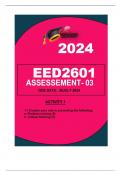,EED2601 ASSIGNMENT 03 - DUE DATE 25JULY 2024
Learners should not only learn about the environment but should also be active
participants in the learning situations in environmental education processes. Your
answer should reflect the process of active learning process by Rosenberg et al.
(2013). In your discussion, clearly indicate the programs that you can initiate to
promote problem solving and critical thinking and how you keep learners engaged
in the whole process of teaching and learning.
1.1 Explain your role in promoting the following:
a. Problem solving (5)
As an environmental educator, my job is to help learners develop problem-solving
skills. Research shows that involving learners in real-world problems and
encouraging them to find solutions is key. To do this, I can use approaches like
project-based learning, case studies, and hands-on activities.
Project-based learning involves assigning students a project that tackles a real
environmental issue. This helps them apply their knowledge and skills in a
practical way, developing critical thinking and problem-solving abilities.
Case studies present students with real-world scenarios, asking them to analyze
the situation, identify issues, and propose solutions based on their understanding
of environmental concepts.
Experiential learning activities, like field trips or outdoor adventures, provide
students with firsthand experiences that require problem-solving in a dynamic
environment. These activities engage learners, enhance critical thinking and
problem-solving skills, and encourage decision-making and creative thinking.
To keep learners engaged, I can facilitate collaboration, ask thought-provoking
questions, and encourage creative thinking. By creating a supportive and
stimulating learning environment, students will be motivated to participate in the
problem-solving process and develop their critical thinking skills.
b. Critical thinking (5)
, As an educator, I play a vital role in helping learners develop critical thinking skills
in environmental education. This enables them to understand environmental
issues better and become responsible citizens. According to Rosenberg et al.
(2013), active learning involves engaging learners in problem-solving activities
that challenge them to think critically about environmental problems and
solutions.
To promote critical thinking, I can initiate project-based learning. This involves
engaging learners in real-world environmental projects, such as building a school
garden or organizing a community clean-up. Through these hands-on experiences,
learners apply their knowledge and skills to solve environmental challenges,
thinking critically about the issues and developing innovative solutions.
To keep learners engaged, I can incorporate collaborative activities, discussions,
and debates into my curriculum. By working together and sharing perspectives,
learners learn from each other and expand their critical thinking skills. I can also
provide opportunities for reflection and self-assessment, allowing learners to
evaluate their thinking processes and identify areas for improvement.
By promoting critical thinking in environmental education through active learning
approaches, I empower learners to become informed and engaged citizens
capable of addressing complex environmental challenges in our society. This helps
them develop a deeper understanding of environmental issues, think critically,
and become active problem-solvers.
Reference:
Rosenberg, M. S., Henderson, J. B., & Malinowski, L. C. (2013). Critical thinking
skills through environmental education. Teaching and Teacher Education, 30, 9-
17.
[Total: 10 Marks]
ACTIVITY 2




